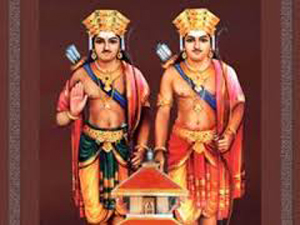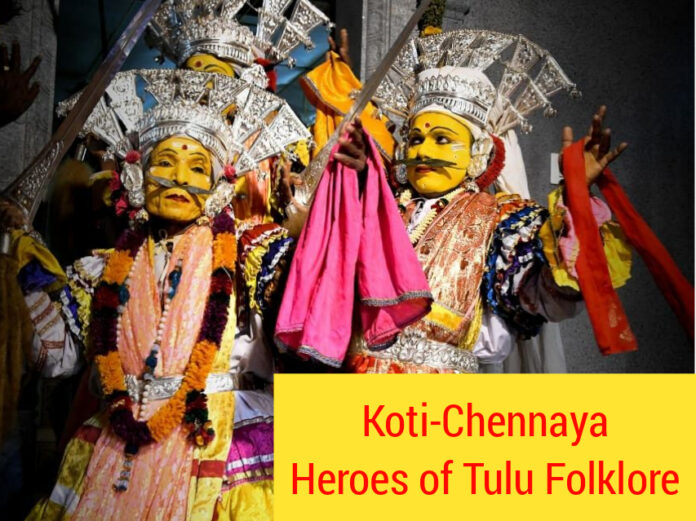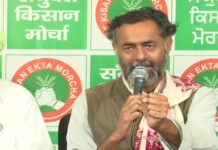[Note by the translator: The twin daivas(spirits) of Koti and Chennaya are one of the most popular folk deities of Tulunadu. Along with other daivas or bhutas such as Kallurti, Bobbarya, Maisandaya, Alibhuta, Koragajja, etc., Koti-Chennaya get venerated in the length and breadth of the Tulu region. Numerous studies suggest that most daivas are reminiscent of the folk heroes of that name, who were subjected to oppression of different sorts to maintain the hierarchical status-quo of the traditional Tulunadu. When they became mayaka (or perished fighting that oppression), they started getting venerated. Being born in the Billava¹caste, Koti-Chennaya were subjected to constant treachery and harassment, even though they came close to power centres. It is roughly estimated that the twin brothers lived in the seventeenth or the eighteenth century. The following story of Koti and Chennaya is a translation based on the story written by Shri Panje Mangesha Rao, an early litterateur in Kannada. Panje himself got several (Tulu) versions of the story – one of them from Hermann Moegling of the Basel Mission. Comparing and contrasting, he finally arrived at the following story in the early twentieth century.]
This is Part IV of the 14 part Koti- Chennaya series
Part III Part II Part I
Ballala was seated in his court. Koti-Chennaya came in and prostrated to the Ballala. The latter said “You did what shouldn’t have been done! Now you will experience what shouldn’t be experienced!”
Koti, in quite a different tone, reminded the Ballala, “Sir, you had promised my mother something…”
“What was that?” Ballala queried.
“After gifting her with ornaments and jewels, you had promised to gift a few more things to her children…”
Ballala said “Please don’t build any connection between what you have committed and what is to be gifted to you.”
“Right sir! Punish us for the murder! But do gift us what is duly ours!” Koti said.
“Otherwise, who will receive the gift from you when we are dead?!” Chennaya added.
Ballala asked, “Tell me, what you want?”
At this moment, Koti placed his demand, “The bakimaaru (2)field overlooking the beedu(3)!”
“Not possible”, Ballala said.
Then Koti demanded “A milch buffalo that never goes dry?!”
“I need it”, replied Ballala.
Next, Koti asked “The jackfruit tree that yields fruit throughout the year!”
Ballala responded, “Oh, leave it! Ask something else…”
“Give us the gardens of your twosome wives!” Koti was firm.
“What did you say?!”
“Why not your royal sword?!” Koti dared!
Ballala reddened with anger. “You grew up drinking milk in our beedu. Now when you dare demand the gardens of my wives and, the royal sword itself, you could demand anything in future. It will be a mistake to let you go like this”. Ballala ordered his servants to arrest Koti-Chennaya and take them away.
Ballala reddened with anger. “You grew up drinking milk in our beedu. Now when you dare demand the gardens of my wives and, the royal sword itself, you could demand anything in future. It will be a mistake to let you go like this”. Ballala ordered his servants to arrest Koti-Chennaya and take them away.
 Koti remembered what his mother had said – “If you ask for something that is rightfully yours, Ballala gets unduly angry”. True, he thought. He uncovered a bag from within his shawl. In the bag were small containers of betel leaves. He took out two varieties of leaves – Panchavalli and Munduvalli. Holding them in his hand, Koti went where Ballala was seated. He placed the betel leaves symbolically on the throne and ominously said, “You have six years’ term to fulfil our demand”. Undaunted, Koti stood firmly with his words. Everyone was taken aback with his imperviousness. Women from the Ballala’s household were utterly frightened. All were so terrified with the gallant stance of Koti-Chennaya that they could not muster up courage even to touch them.
Koti remembered what his mother had said – “If you ask for something that is rightfully yours, Ballala gets unduly angry”. True, he thought. He uncovered a bag from within his shawl. In the bag were small containers of betel leaves. He took out two varieties of leaves – Panchavalli and Munduvalli. Holding them in his hand, Koti went where Ballala was seated. He placed the betel leaves symbolically on the throne and ominously said, “You have six years’ term to fulfil our demand”. Undaunted, Koti stood firmly with his words. Everyone was taken aback with his imperviousness. Women from the Ballala’s household were utterly frightened. All were so terrified with the gallant stance of Koti-Chennaya that they could not muster up courage even to touch them.
At that instance, the twins went down the stairs and disappeared from the beedu.
As this happened, Ballala fainted because of the shock! Opening his eyes after an hour, he thought such haughtiness of these Billavas is an ill omen for the beedu and an problem for the village. With the intent of killing the twins, he tried to obtain their possession in a variety of ways, but in vain. Thus, Koti-Chennaya became elusive in Ballala’s own country. They were going about their business scot-free without any fear. Once, when they were tired of walking in the sun and were utterly thirsty, they came to the shade of a peepal tree. Nearby, was an aravattige((4). There were vessels containing water.
Chennaya called out aloud, “Is there anyone here? We need some water!”(5)
A Brahmin emerged from a thatched house nearby. He stared at them and said with indifference “I want to know about you”.
“By caste, we are toddy-tappers”, Koti said.
“By precept, we are ones who wear thread”,(6) said Chennaya.
The man at the aravattige felt comfortable with the response and said, “Then come from the southern side. I shall pour water from the bronze vessel. Stretch your arms and drink”.
“We wouldn’t drink from a vessel that has been used by a hundred tribes!” Chennaya asserted.
The Brahmin anxiously asked, “what can I do then?”
Chennaya replied “I shall stretch out my sword. Pour water on the other side and we shall drink”. He drank without spilling a drop of it. The Brahmin was astonished at this trick of Chennaya.
After a while, Koti got into a conversation with the Brahmin and asked him, “Swami, who are you? A Brahmin of aravattige? Or a fortune-teller?”
The Brahmin said, “if you want, I can be a fortune-teller too”. He went to his hut and brought his paraphernalia – a bead with white lines, a bag full of cowrie shells, a mat made of darbe(7) grass. He sat down; the twin brothers were watching, sitting nearby. The Brahmin counted the cowrie shells; gestured the count on his fingers; wrote on the floor through clay; chanted some mantra; stared at their faces and said in a secretive way,
“It looks like two elephant calves have fallen out of forest; muddied the brook and trampled the paddy field. Now they seem to have set their eyes on sugarcane fields”
“Well said Jois!(8) What else can you see?!” asked Chennaya.
The Brahmin continued his calculation and said, “It seems to me that the calves have risk from all four directions. Risk of fire on the east; of deception from the west; of muskets from the north; trouble from crocodiles in the south. But you will…” Before he finished his sentence, Chennaya shouted – “tell us, what awaits us?”
The Brahmin lost his calculation as Chennaya shouted. He counted again and said “You should leave the place”.
“Where should we go?” Koti asked.
“You should go till here”, said the Brahmin showing a point in his palm.
“Once we reach this place, will we have a better future?” Koti continued to query.
The Brahmin shook his cowries again and spoke puzzlingly, “After you reach Ayyanuru, I see more of bad times for you. There are signs of quarrel as well”.
Koti asked, “Quarrel? Between whom?”
Brahmin answered, “Between elephant and crocodile”
“If I kill the crocodile in the quarrel…?” Chennaya sought further prediction.
Koti reinforced, “Tell us what will be the result of that quarrel”.
The Brahmin once again counted his shells and said, “In the quarrel, er.. er..”, he yawned.
Chennaya queried, “Jois, can’t you speak?”
“Oh Billava men, the spring of truth will ooze; the river of fame will flow; the seeds of peace will grow; the fruits of happiness will be borne”, the Brahmin said mysteriously. He took the name of god; made obeisance to his paraphernalia; concluded his fortune-telling session and went into his house.
Koti-Chennaya were not sure if they liked what the Brahmin said. But they waited for the Brahmin to emerge again from the house.
The Brahmin came back with a couple of tumblers with milk in it. The brothers drank it and accepted the betel leaves offered by the Brahmin.
The dusk was approaching and so both of them proceeded further after they offered their obeisance to the Brahmin and his paraphernalia.
From that aravattige the border of Padumale Ballala’s kingdom was not very far. Only a small hillock was in between. The brothers were crossing the hillock and Chennaya asked, “Oh brother, what a surprise! Is the sun setting in the east today!?” Koti turned towards where his brother pointed and saw the reddish patch on the eastern horizon. “Brother, isn’t it where our house is? No, it isn’t the colour of dusk. It is the expanse of the fiery flame that has consumed our house!” he said.
Chennaya exclaimed, “Oh, the fortune teller’s words about risk from the East has already become true. Alas! Whatever happened to our dear ones!?”
Koti consoled him, “They would have left the house well in advance. God willing, we shall see our mother again”. It was well into the night when they reached the border of the kingdom. Just before the border, there was a toll centre. There was one Dere, who heard the footsteps of the brothers. He enquired, “Who is it… moving in the dark?”
“We are travellers”, replied Koti.
“Whoever you are, pay the tax and proceed”, Dere said without moving from his place.
Koti said “Tax? What for? For the salt in our sweat? For the lime in the veelya(9) in our mouth?
Chennaya said, “A tax for our hair? Or for our footwear?”
At this moment, Dere peeped out and said “A tax on the steel sword in your hand”.
Chennaya declared, “There was no one who could really value our sword. There won’t be any either!”
To this, Dere replied “I have levied taxes on decorative flowers on the sandals of the Bantas(10); levied taxes on the umbrella-handle of the Shetti; levied taxes on the horn of the prince’s palanquin. Will I leave you?”
Chennaya got infuriated. He went a few steps ahead and said, “Oh, so you will catch us? Come down! We were hardly afraid of the Ballala! Why should we be afraid of you? Down, you come and tax us!”
Listening to the Ballala’s name, Dere was petrified. Saying he would bring a lamp, he went inside, never to return!
Koti-Chennaya left the territory of Padumale Ballala. They walked all the night without resting anywhere. Before dawn, they reached Panja.
Glossary of Kannada and Tulu words
-
A community in coastal Karnataka with almost one-fifth of the population in that region. The traditional occupation of the community was toddy tapping and working as agricultural help.
- A large field in front of a traditional homestead in the Tuluva region.
- The feudal homestead of the Ballala
- A kind of shed or structure, where water, buttermilk, etc. were served to travellers in olden days.
- Billavas were treated almost like untouchables in traditional Tulunadu. Hence, they could not directly handle the water vessels.
- i.e. Brahmins.
- A variety of grass used in Vedic rituals.
- An astrologer
- A combination of betel leaf, betel nuts, tobacco and lime that is chewed as a habit.
- Men of Bunt community




























[…] ಭಾರತೀಯ ಚಿತ್ರರಂಗವೇ ದಕ್ಷಿಣ ಭಾರತದ ಸಿನಿ ರಂಗದ ಕಡೆ ತಿರುಗುವಂತೆ ಮಾಡಿದ ಚಿತ್ರ ಎಂದರೆ ಎಸ್.ಎಸ್ ರಾಜಮೌಳಿ ನಿರ್ದೇಶನದ ಬಾಹುಬಲಿ ಸರಣಿ ಸಿನಿಮಾಗಳು. 2015 ರಲ್ಲಿ ರಿಲೀಸ್ ಆಗಿದ್ದ ಬಾಹುಬಲಿ-ದಿ ಬಿಗಿನ್ನಿಂಗ್ ಹಾಗೂ 2017 ರಲ್ಲಿ ಅದರ ಮುಂದುವರಿದ ಭಾಗವಾಗಿ ಬಂದ ಬಾಹುಬಲಿ-ದಿ ಕನ್ಕ್ಲೂಷನ್ ಸಿನಿಮಾ ಸೂಪರ್ ಹಿಟ್ ಆಗಿದ್ದವು. […]